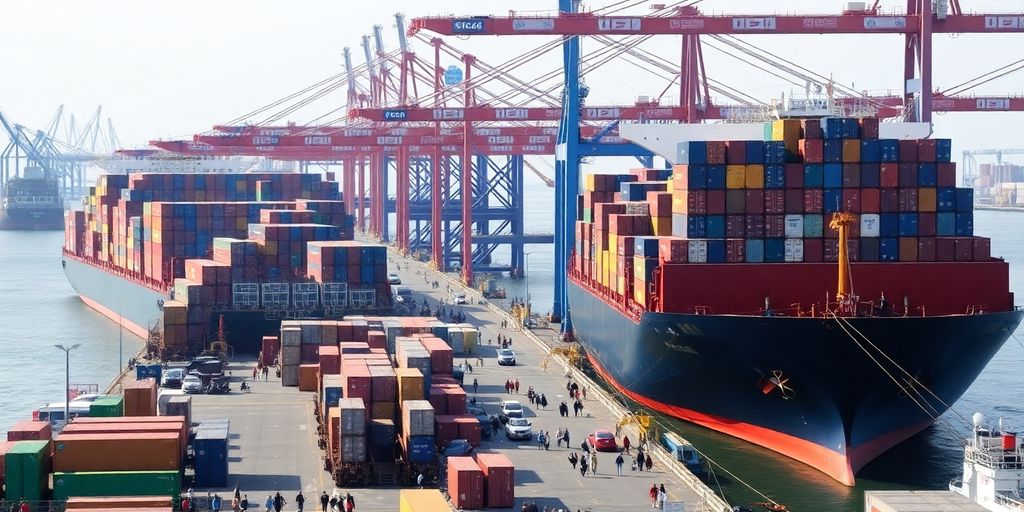Ever wondered why shipping costs can skyrocket? A big chunk of that comes from port charges. These are the fees you pay when your goods arrive at or leave a port. They cover everything from docking your ship to unloading your cargo. Understanding these charges is key for anyone involved in importing or exporting. This article breaks down the different types of port charges, how they impact your wallet, and ways to keep those costs in check.
Key Takeaways
- Port charges significantly affect the total cost of shipping goods.
- Understanding different port fees can help you budget more effectively.
- Some charges, like demurrage and detention, can be avoided with proper planning.
- Using shipper-owned containers might reduce unexpected fees.
- Partnering with a reliable freight forwarder can simplify managing port charges.
Understanding Port of Charge: Key Concepts

Definition and Importance
The term "port of charge" refers to the various fees that are levied when a vessel docks at a port to load or unload cargo. These fees are crucial because they cover the use of port facilities and services, ensuring the smooth operation of shipping activities. Without these charges, ports wouldn’t be able to maintain their infrastructure or provide essential services.
- Port Charges: These are fees for specific services like cargo handling and use of port equipment.
- Port Dues: These are general fees for the vessel’s presence in the port, often based on size.
- Impact on Costs: Port charges can significantly affect the shipping costs, influencing the final price of goods.
How It Affects Shipping Costs
Port charges are a significant factor in determining the overall cost of shipping goods. They are not just about the distance traveled or the weight of the cargo but include fees for using the port’s services and infrastructure. For instance, higher charges can lead to increased costs for importers and exporters, affecting everything from supply chain efficiency to the price of consumer goods.
Understanding these costs is essential for businesses to maintain competitive pricing and manage their shipping budgets effectively.
Common Misconceptions
Many people confuse port charges with customs duties or taxes. While customs duty is a tax imposed on imported goods, port charges are fees for using port services. Another common misconception is that all ports charge the same fees, but in reality, charges vary widely depending on the port and the services used. It’s also a myth that these charges are fixed and non-negotiable; in some cases, businesses can negotiate lower fees or qualify for discounts, especially if they are frequent users of a particular port.
Breakdown of Common Port Charges

Understanding the costs associated with shipping is crucial for anyone involved in import-export operations. Let’s dive into the different types of port charges you might encounter.
Ship Dues and Their Calculation
Ship dues are fees that vessels pay to use port facilities. These charges are typically based on the size and type of your vessel. For instance, a ship’s gross tonnage often determines the fee, with larger vessels incurring higher costs. These dues are essential for maintaining the port’s infrastructure and ensuring smooth operations. For example, a 20,000 GT vessel might face ship dues of $5,000 at a major port. This fee ensures that the port can accommodate the incoming and outgoing ships efficiently.
Goods Dues: What You Need to Know
Goods dues, often referred to as wharfage, are the fees charged for using the port’s wharf to load and unload cargo. These charges depend on the type and amount of cargo. For example, bulk goods like grain might be charged per ton, while containerized goods are typically charged per TEU (twenty-foot equivalent unit). Planning and understanding these charges can help in budgeting and avoiding unexpected costs.
Terminal Handling Charges Explained
Terminal Handling Charges (THC) cover the expenses associated with loading, unloading, and maintaining containers. These charges include costs for port equipment and labor. Whether you’re importing or exporting, THCs are unavoidable and are calculated based on the number and size of containers. For instance, handling a 40-foot container might cost around $300. Knowing these fees can help streamline logistics and reduce overall shipping expenses.
Keeping track of these charges and understanding their implications can significantly impact your shipping budget. Proper planning and negotiation can lead to cost savings and more efficient shipping operations.
Navigating Additional Fees at Ports
Demurrage and Detention Charges
Demurrage and detention charges can be a real headache for shippers. Demurrage fees are what you pay when your containers sit at the port beyond the free time allowed. Conversely, detention fees hit when containers are kept outside the port longer than permitted. These charges are in place to encourage quick movement of goods. For instance, after a five-day free period, demurrage might cost $75 per container per day, while detention could be $100 outside the port. To avoid these costs, plan your logistics well, ensuring timely pick-up and delivery.
Quarantine and Security Fees
Quarantine services fees kick in when there’s a need to isolate cargo due to health or safety regulations. These charges cover inspection, isolation, and any necessary treatment. The cost varies based on the nature and duration of the quarantine. On the other hand, port security charges ensure the safety of the port, covering the cost of security personnel, surveillance systems, and access control measures. These fees are essential for maintaining a secure environment for cargo handling.
Emergency and Utility Service Costs
Ports also charge for emergency services like firefighting, medical assistance, and environmental response. These fees are higher than regular service charges due to the specialized nature of the services. Additionally, port utilities such as water, electricity, and waste disposal come with their own fees, based on usage. Monitoring your consumption can help avoid excessive costs. It’s crucial to keep track of these services to manage your expenses effectively.
Understanding and managing these additional fees can significantly impact your overall shipping costs. Keeping a close eye on timelines and planning can help mitigate unexpected charges.
Strategies to Minimize Port of Charge Expenses

Effective Planning and Negotiation
When it comes to cutting down on port fees, planning is your best friend. Start by negotiating with port authorities and service providers well in advance. This can help you secure better rates and avoid those pesky last-minute charges. For instance, if you arrange berthing schedules early, you might dodge hefty early or late arrival fees. And don’t be shy—talk openly about your needs and see if you can work out terms that suit you.
Utilizing Shipper-Owned Containers
Ever thought about using shipper-owned containers (SOCs)? These can give you more control over demurrage and detention fees. With SOCs, you decide the timing for returning containers, which means you can avoid steep detention costs. This not only helps in managing expenses but also boosts your logistics efficiency. If you’re tired of relying on carrier-owned containers, SOCs might be the way to go.
Leveraging Technology for Cost Efficiency
Technology is your ally in keeping port costs down. Advanced tracking systems let you monitor your cargo in real-time, helping you avoid unnecessary fees like demurrage and detention. By knowing exactly where your containers are, you can ensure timely pickups and deliveries. Plus, efficient document management systems can prevent delays due to mismanaged paperwork. Keeping your shipping documents accurate and on time can save you from fines and holdups.
"By staying organized and proactive, you can minimize the risk of extra charges."
Consider these strategies as part of your toolkit to manage and reduce port charges effectively. Whether it’s negotiating better deals, choosing cost-effective ports, or using technology, each step can lead to significant savings. And remember, exploring volume discounts with ports can also be a smart move for cutting down expenses.
Avoiding Hidden and Erroneous Port Charges
Identifying Common Hidden Fees
When dealing with port charges, it’s easy to get caught off guard by fees you weren’t expecting. These hidden fees can include things like additional handling charges or unexpected surcharges that weren’t clearly outlined in your initial agreement. To avoid these surprises, always ask for a detailed breakdown of all potential charges from your freight forwarders. This way, you can plan your budget more accurately and avoid any nasty surprises.
Steps to Contest Incorrect Charges
If you find yourself facing charges that don’t seem right, don’t just accept them. Contest any charges you believe are incorrect. Start by gathering all relevant documentation, such as invoices and agreements, to support your case. Then, reach out to the port authority or billing department to dispute the charges. Staying organized and maintaining clear records can make this process smoother and more effective.
Working with Reliable Freight Forwarders
Partnering with a trusted freight forwarder can be one of the best ways to avoid hidden and erroneous charges. Reliable partners are more likely to offer transparent pricing and will help you navigate the complexities of port fees. They can also assist in managing logistics efficiently, reducing the chances of errors or unexpected costs. By choosing the right partner, you can focus more on your business and less on worrying about unexpected port fees.
Impact of Port Charges on Global Trade

Influence on Import and Export Pricing
Port charges have a direct impact on the pricing of goods as they move across borders. These charges can range from handling fees to security costs, and they all add up to affect the final price of goods. Higher port charges can lead to increased costs for importers and exporters, which then trickle down to consumers. For instance, when port charges rise, businesses may have to adjust their pricing strategies to maintain profit margins, potentially leading to higher retail prices.
- Shipping costs are influenced by various port fees, including:
- Terminal handling charges
- Security and inspection fees
- Quarantine services
Role in Supply Chain Management
Effective supply chain management requires a keen understanding of port charges. These fees can significantly alter the cost structure of transporting goods. Companies often work with freight forwarders to navigate these costs effectively. By understanding port charges, businesses can better manage logistics and maintain competitive pricing.
- Key factors in managing port charges include:
- Negotiating fees with ports
- Choosing the right shipping routes
- Utilizing technology for real-time tracking
Understanding and managing port charges is essential for businesses to maintain efficiency and cost-effectiveness in their supply chains.
Future Trends in Port Charges
As global trade evolves, so do the trends in port charges. Factors such as technological advancements and environmental regulations are shaping the future of these fees. Ports are increasingly investing in technology to streamline operations and reduce costs, which may eventually lead to more competitive pricing.
- Emerging trends include:
- Increased automation in port operations
- Implementation of greener technologies
- Fluctuations due to geopolitical tensions
Ports are also responding to global shipping cost surges and maritime threats, which may influence how charges are structured in the future. Understanding these trends is crucial for businesses looking to optimize their logistics and remain competitive in the global market.
Choosing the Right Partner to Manage Port Charges
Benefits of Experienced Freight Forwarders
Picking the right freight forwarder can make a world of difference when it comes to handling port charges. An experienced partner can help you navigate the complex world of fees and charges, ensuring you don’t pay more than you should. Here are a few benefits of working with a seasoned freight forwarder:
- Knowledge of Local Regulations: They understand the ins and outs of port regulations, which can save you from unnecessary fines or fees.
- Efficient Handling of Documentation: Proper paperwork is crucial. An experienced forwarder ensures all documents are in order, helping you avoid delays and extra charges.
- Negotiation Skills: They often have established relationships with port authorities and can negotiate better terms for you.
How Pazago Can Help
If you’re looking to streamline your import-export operations, partnering with a port warehousing specialist like Pazago can offer significant advantages. Pazago provides tailored solutions that can help minimize port charges and optimize your logistics. They offer comprehensive support, from real-time tracking to efficient cargo handling, ensuring your goods move smoothly through the port.
Working with a professional port agency can transform your shipping experience, providing transparency and peace of mind. By comparing pricing structures and ensuring value for money, you can avoid hidden fees and manage costs effectively.
Key Considerations When Selecting a Partner
When choosing a partner to manage your port charges, keep these key points in mind:
- Transparency in Pricing: Ensure the partner provides clear and upfront pricing without hidden charges.
- Proven Track Record: Look for a partner with a history of successfully managing port operations and charges.
- Comprehensive Services: They should offer a range of services, from logistics planning to warehousing solutions.
Selecting the right partner can help you prepare for potential port disruptions and ensure your operations run smoothly, even in challenging situations. With the right support, you can focus on your core business while leaving the complexities of port charges to the experts.
When it comes to managing port charges, picking the right partner is key. You want someone who understands the ins and outs of shipping costs and can help you save money. At Aeonix Trade, we specialize in making international trade easier for you. Visit our website to learn more about how we can help you navigate port charges and streamline your shipping process!
Conclusion
Wrapping up, understanding import and export fees is like piecing together a puzzle. Each charge, from delivery to customs, plays a role in the bigger picture of shipping costs. It’s not just about paying bills; it’s about knowing what you’re paying for and why. By being informed, you can avoid those surprise fees that can throw your budget off track. Working with a reliable partner can make this process smoother, ensuring transparency and helping you plan better. So, next time you’re dealing with port charges, remember: knowledge is your best tool.
Frequently Asked Questions
What are anchorage fees?
Anchorage fees are charges for ships that anchor in a port’s specified area. They depend on how long the ship stays and its size. These fees help keep the anchorage area safe and orderly.
Can frequent port users get discounts?
Yes, many ports offer discounts to regular users or for large shipments. These discounts can be negotiated based on the amount of business you bring to the port. Always check with the port to see if you qualify.
How do ports handle charges for hazardous materials?
Ports charge extra for handling dangerous goods. These fees cover the special care and equipment needed to manage such cargo safely. The cost depends on the type of hazardous material and the port’s rules.
What are the fees for using port utilities?
Fees for port utilities like water, electricity, and waste disposal depend on usage. It’s important to track your use to avoid high costs.
Can I contest port charges if I think they're wrong?
Yes, if you believe a charge is incorrect, you can dispute it. Contact the port’s billing department with your records to resolve any issues.
Are there fees for emergency services at ports?
Yes, ports charge for emergency services like firefighting and medical help. These fees cover the cost of keeping these services ready and are usually higher than regular charges.





